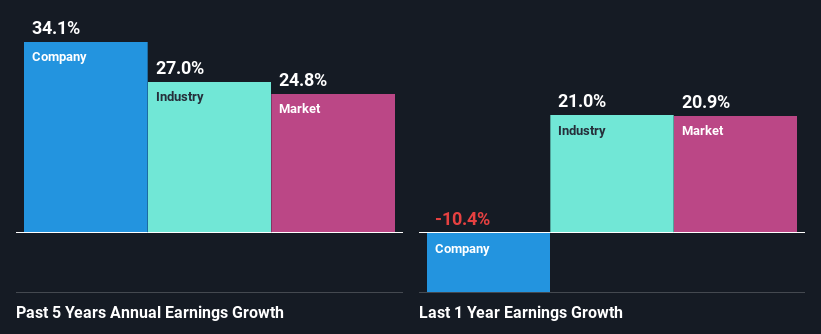- India
- /
- Auto Components
- /
- NSEI:APOLLOTYRE
Is Apollo Tyres Limited's (NSE:APOLLOTYRE) Recent Stock Performance Influenced By Its Fundamentals In Any Way?
Apollo Tyres' (NSE:APOLLOTYRE) stock is up by a considerable 7.5% over the past month. Given that stock prices are usually aligned with a company's financial performance in the long-term, we decided to study its financial indicators more closely to see if they had a hand to play in the recent price move. In this article, we decided to focus on Apollo Tyres' ROE.
Return on Equity or ROE is a test of how effectively a company is growing its value and managing investors’ money. In other words, it is a profitability ratio which measures the rate of return on the capital provided by the company's shareholders.
See our latest analysis for Apollo Tyres
How To Calculate Return On Equity?
The formula for return on equity is:
Return on Equity = Net Profit (from continuing operations) ÷ Shareholders' Equity
So, based on the above formula, the ROE for Apollo Tyres is:
10% = ₹15b ÷ ₹143b (Based on the trailing twelve months to September 2024).
The 'return' is the yearly profit. One way to conceptualize this is that for each ₹1 of shareholders' capital it has, the company made ₹0.10 in profit.
What Has ROE Got To Do With Earnings Growth?
So far, we've learned that ROE is a measure of a company's profitability. Based on how much of its profits the company chooses to reinvest or "retain", we are then able to evaluate a company's future ability to generate profits. Assuming everything else remains unchanged, the higher the ROE and profit retention, the higher the growth rate of a company compared to companies that don't necessarily bear these characteristics.
A Side By Side comparison of Apollo Tyres' Earnings Growth And 10% ROE
When you first look at it, Apollo Tyres' ROE doesn't look that attractive. However, its ROE is similar to the industry average of 12%, so we won't completely dismiss the company. Moreover, we are quite pleased to see that Apollo Tyres' net income grew significantly at a rate of 34% over the last five years. Considering the moderately low ROE, it is quite possible that there might be some other aspects that are positively influencing the company's earnings growth. For instance, the company has a low payout ratio or is being managed efficiently.
As a next step, we compared Apollo Tyres' net income growth with the industry, and pleasingly, we found that the growth seen by the company is higher than the average industry growth of 27%.

The basis for attaching value to a company is, to a great extent, tied to its earnings growth. The investor should try to establish if the expected growth or decline in earnings, whichever the case may be, is priced in. By doing so, they will have an idea if the stock is headed into clear blue waters or if swampy waters await. If you're wondering about Apollo Tyres''s valuation, check out this gauge of its price-to-earnings ratio, as compared to its industry.
Is Apollo Tyres Using Its Retained Earnings Effectively?
Apollo Tyres has a really low three-year median payout ratio of 24%, meaning that it has the remaining 76% left over to reinvest into its business. This suggests that the management is reinvesting most of the profits to grow the business as evidenced by the growth seen by the company.
Besides, Apollo Tyres has been paying dividends for at least ten years or more. This shows that the company is committed to sharing profits with its shareholders. Our latest analyst data shows that the future payout ratio of the company over the next three years is expected to be approximately 21%. Still, forecasts suggest that Apollo Tyres' future ROE will rise to 14% even though the the company's payout ratio is not expected to change by much.
Summary
In total, it does look like Apollo Tyres has some positive aspects to its business. With a high rate of reinvestment, albeit at a low ROE, the company has managed to see a considerable growth in its earnings. Having said that, the company's earnings growth is expected to slow down, as forecasted in the current analyst estimates. Are these analysts expectations based on the broad expectations for the industry, or on the company's fundamentals? Click here to be taken to our analyst's forecasts page for the company.
New: Manage All Your Stock Portfolios in One Place
We've created the ultimate portfolio companion for stock investors, and it's free.
• Connect an unlimited number of Portfolios and see your total in one currency
• Be alerted to new Warning Signs or Risks via email or mobile
• Track the Fair Value of your stocks
Have feedback on this article? Concerned about the content? Get in touch with us directly. Alternatively, email editorial-team (at) simplywallst.com.
This article by Simply Wall St is general in nature. We provide commentary based on historical data and analyst forecasts only using an unbiased methodology and our articles are not intended to be financial advice. It does not constitute a recommendation to buy or sell any stock, and does not take account of your objectives, or your financial situation. We aim to bring you long-term focused analysis driven by fundamental data. Note that our analysis may not factor in the latest price-sensitive company announcements or qualitative material. Simply Wall St has no position in any stocks mentioned.
About NSEI:APOLLOTYRE
Apollo Tyres
Manufactures and sells automotive tires, tubes, and flaps in India and internationally.
Flawless balance sheet established dividend payer.
Similar Companies
Market Insights
Community Narratives





